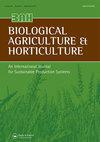谷物作为农业生态服务作物和免耕对有机甜瓜、杂草和氮素动态的影响
IF 1.6
4区 农林科学
Q3 AGRONOMY
引用次数: 8
摘要
摘要在意大利中部进行了为期两年的田间试验,通过评估土壤-植物氮动态、杂草管理和作物性能,并与未进行ASC的耕作对照进行比较,对有机甜瓜生产前采用免耕滚轮卷曲技术终止的不同农业生态服务作物(ASCs)进行了评价。ASCs(禾本科,即黑麦、大麦、小麦、斯佩尔特小麦及其混合物)的地上生物量、氮吸收、碳氮比和降解率是其特征。在甜瓜生长周期内测定土壤矿质氮(SMN)、杂草密度和生物量,试验设计包括除草和未除草样地。测定了甜瓜的产量和可溶性固形物浓度。不同覆盖层的氮素供应能力和降解速率存在差异。黑麦和斯佩尔麦对杂草的控制效果最好,与对照相比,黑麦和斯佩尔麦的杂草密度和生物量都降低了约80%。小麦对杂草的防治效果最差,但能增强SMN。小麦和黑麦、除草和未除草处理的甜瓜产量相似,但与除草处理相比,未除草对照(- 58.5%)和大麦处理(- 41.2%)的甜瓜产量有所下降。黑麦种植小区甜瓜产量低,表明黑麦与黑瓜存在负化感互作关系。结果表明,农业生态系统具有不同程度的调控作用。本文章由计算机程序翻译,如有差异,请以英文原文为准。
Effects of cereals as agro-ecological service crops and no-till on organic melon, weeds and N dynamics.
ABSTRACT In a two-year field experiment undertaken in Central Italy, different agro-ecological service crops (ASCs), terminated by the no-till roller crimper technology before organic melon production (Cucumis melo L.), were evaluated by assessing soil-plant N dynamics, weed management and crop performance, and by comparing with a tilled control without ASC. The ASCs (Poaceae, i.e. rye, barley, wheat, spelt and their mixture), were characterised in terms of aboveground biomass, N uptake, C : N ratio and degradation rate. During the melon growth cycle, soil mineral N (SMN), weed density and biomass were measured and the design of trial included weeded and unweeded plots. The yield and concentrations of soluble solids of the melon was measured. The ASC mulches differed in their N supply capacity and degradation rate. Rye and spelt were the best in terms of weed control, with approximately 80% lower weed density and weed biomass for either rye or spelt compared with the control. Wheat was the least effective against weeds, but it enhanced SMN. Melon yields were similar in plots with spelt and rye, weeded and unweeded treatments, but were reduced in the unweeded control (−58.5%) and barley treatment (−41.2%), compared with the respective weeded treatments. The low melon yield in the plots with rye suggested a negative allelopathic rye-melon interaction. The results highlighted that the ASCs were able to regulate, to different extents, the agro-ecosystem interactions.
求助全文
通过发布文献求助,成功后即可免费获取论文全文。
去求助
来源期刊
CiteScore
3.30
自引率
6.70%
发文量
18
审稿时长
>36 weeks
期刊介绍:
Biological Agriculture & Horticulture aims to act as the central focus for a wide range of studies into alternative systems of husbandry, and particularly the biological or organic approach to food production. The Journal publishes work of a sound scientific or economic nature related to any aspect of biological husbandry in agriculture, horticulture and forestry in both temperate and tropical conditions, including energy and water utilization, and environmental impact.

 求助内容:
求助内容: 应助结果提醒方式:
应助结果提醒方式:


